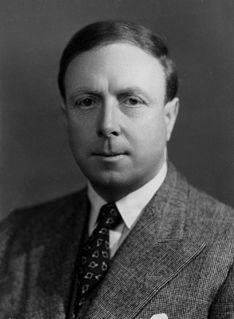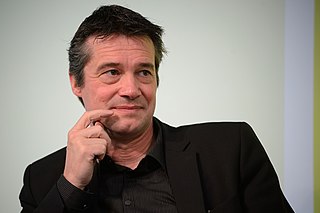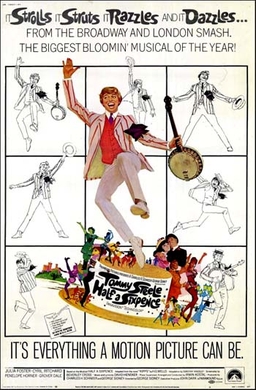
Archibald Joseph Cronin, known as A. J. Cronin, was a Scottish physician and novelist. His best-known novel is The Citadel (1937), about a Scottish doctor who serves in a Welsh mining village before achieving success in London, where he becomes disillusioned about the venality and incompetence of some doctors. Cronin knew both areas, as a medical inspector of mines and as a doctor in Harley Street. The book exposed unfairness and malpractice in British medicine and helped to inspire the National Health Service. The Stars Look Down, set in the North East of England, is another of his best-selling novels inspired by his work among miners. Both novels have been filmed, as have Hatter's Castle, The Keys of the Kingdom and The Green Years. His 1935 novella Country Doctor inspired a long-running BBC radio and TV series, Dr. Finlay's Casebook (1962–1971), set in the 1920s. There was a follow-up series in 1993–1996.

At Swim-Two-Birds is a 1939 novel by Irish writer Brian O'Nolan, writing under the pseudonym Flann O'Brien. It is widely considered to be O'Brien's masterpiece, and one of the most sophisticated examples of metafiction.
A minced oath is a euphemistic expression formed by deliberately misspelling, mispronouncing, or replacing a part of a profane, blasphemous, or taboo word or phrase to reduce the original term's objectionable characteristics. An example is "gosh" for "God".

"Sing a Song of Sixpence" is an English nursery rhyme, perhaps originating in the 18th century. It is listed in the Roud Folk Song Index as number 13191. The sixpence in the rhyme is a British coin that was first minted in 1551.

Half a Sixpence is a 1963 musical comedy based on the 1905 novel Kipps by H. G. Wells, with music and lyrics by David Heneker and a book by Beverley Cross. It was written as a vehicle for British pop star Tommy Steele.
Anthony Gerard Richard Cronin was an Irish poet, arts activist, biographer, commentator, critic, editor and barrister.

The British sixpence piece, sometimes known as a tanner or sixpenny bit, was a denomination of sterling coinage worth 1⁄40 of one pound or half of one shilling. It was first minted in 1551, during the reign of Edward VI, and circulated until 1980. The coin was made from silver from its introduction in 1551 until 1947, and thereafter in cupronickel.
James Duffy was a prominent Irish author and publisher. Duffy's business would become one of the major publishers of Irish nationalist books, bibles, magazines, Missals and religious texts throughout the 19th and 20th centuries. He was also a major publisher of Irish fiction. He was described as having "invented a new kind of cosy family Catholicism."
The three-volume novel was a standard form of publishing for British fiction during the nineteenth century. It was a significant stage in the development of the modern novel as a form of popular literature in Western culture.

Rainer Forst is a German philosopher and political theorist, and was called the "most important political philosopher of his generation" in 2012, when he won the Gottfried Wilhelm Leibniz Prize. Currently he is Professor of Political Theory at the Department for Social Sciences, Johann Wolfgang Goethe University in Frankfurt. He is often identified with the newest generation of scholars associated with the Frankfurt School of critical theory. He received his doctorate under the supervision of Jürgen Habermas in 1993, with additional supervision by John Rawls from 1991 to 1992.

Through its effect on the world's population and major artists in various fields, tuberculosis has appeared in many forms in human culture. The disease was for centuries associated with poetic and artistic qualities in its sufferers, and was known as "the romantic disease". Many artistic figures including the poet John Keats, the composer Frédéric Chopin and the artist Edvard Munch either had the disease or were close to others who did.

Hatter's Castle is a 1942 British film noir based on the 1931 novel Hatter's Castle by A. J. Cronin, which dramatizes the ruin that befalls a Scottish hatter set on recapturing his imagined lost nobility. The film was made by Paramount British Pictures and stars Robert Newton, Deborah Kerr, James Mason, and Emlyn Williams. It is believed to be the only film that depicts the Tay Bridge disaster.

A Song of Sixpence is a 1964 novel by A. J. Cronin about the coming to manhood of Laurence Carroll and his life in Scotland. Its sequel is A Pocketful of Rye.

Half a Sixpence is a 1967 British musical film directed by George Sidney and choreographed by Gillian Lynne. The screenplay by Beverley Cross is adapted from his book for the 1963 stage musical of the same name, which was based on Kipps: The Story of a Simple Soul, a 1905 novel by H. G. Wells. The music and lyrics are by David Heneker.
Pocketful of Rye or pocket full of rye may refer to:
Michael Paraskos, FHEA, FRSA is a novelist, lecturer and writer on art. He has written several non-fiction and fiction books and essays, and articles on art, literature, culture and politics for various publications, including Art Review, The Epoch Times and The Spectator magazine. In the past he has reviewed art exhibitions for BBC radio, curated exhibitions, and taught in universities and colleges in Britain and elsewhere. He has a particular focus on modern art, having published books on the art theorist Herbert Read, and he is also known for his theories connecting anarchism and modern art. He lives in West Norwood in south London.

Romanticism in Scotland was an artistic, literary and intellectual movement that developed between the late eighteenth and the early nineteenth centuries. It was part of the wider European Romantic movement, which was partly a reaction against the Age of Enlightenment, emphasising individual, national and emotional responses, moving beyond Renaissance and Classicist models, particularly to the Middle Ages. The concept of a separate national Scottish Romanticism was first articulated by the critics Ian Duncan and Murray Pittock in the Scottish Romanticism in World Literatures Conference held at UC Berkeley in 2006 and in the latter's Scottish and Irish Romanticism (2008), which argued for a national Romanticism based on the concepts of a distinct national public sphere and differentiated inflection of literary genres; the use of Scots language; the creation of a heroic national history through an Ossianic or Scottian 'taxonomy of glory' and the performance of a distinct national self in diaspora.

The novel in Scotland includes all long prose fiction published in Scotland and by Scottish authors since the development of the literary format in the eighteenth century. The novel was soon a major element of Scottish literary and critical life. Tobias Smollett's picaresque novels, such as The Adventures of Roderick Random and The Adventures of Peregrine Pickle mean that he is often seen as Scotland's first novelist. Other Scots who contributed to the development of the novel in the eighteenth century include Henry Mackenzie and John Moore.

Literature in modern Scotland is literature written in Scotland, or by Scottish writers, since the beginning of the twentieth century. It includes literature written in English, Scottish Gaelic and Scots in forms including poetry, novels, drama and the short story.













